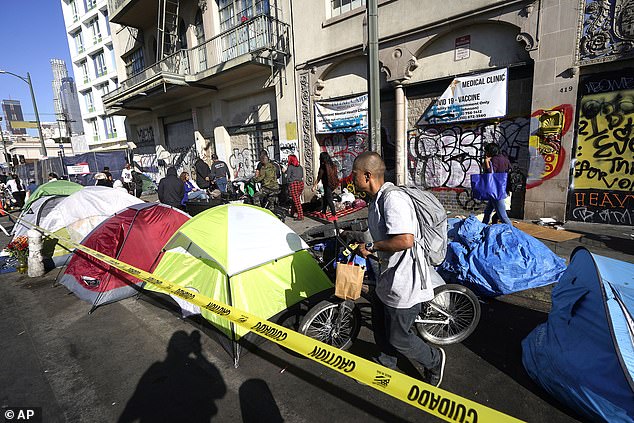Supreme Court makes shock ruling on homeless crisis
The Supreme Court ruled Friday that cities can impose bans on outdoor sleeping by homeless people, even in areas of the West Coast where shelter space is in short supply.
The case is the most important on the subject before the Supreme Court in decades. The case comes at a time when more and more people in the US are without permanent residence.
In an ideological decision by a 6-3 vote, the Supreme Court overturned a San Francisco appeals court ruling that a ban on sleeping outdoors amounts to cruel and unusual punishment.
The majority held that the Eighth Amendment’s prohibition does not apply to bans on sleeping outdoors.
The Supreme Court ruled Friday that cities can impose bans on homeless people sleeping outdoors, even in shelter-poor areas on the West Coast. In Seattle in March, residents of a homeless encampment were seen
‘Homelessness is complex. The causes are numerous. And so may the public policy responses needed to address it,” Justice Neil Gorsuch wrote for the majority.
“A handful of federal judges cannot ‘match’ the collective wisdom of the American people in deciding ‘how best to deal’ with a pressing social issue like homelessness.”
He suggested that people who have no choice but to sleep outdoors could raise this as a “necessity defense” if they are ticketed or otherwise punished for violating a camping ban.
A bipartisan group of leaders had argued that the ruling against the bans would make it harder to manage outdoor encampments that encroach on sidewalks and other public spaces in nine Western states, including California, home to a third of the nation’s homeless population.
“Cities across the West are reporting that the 9th Circuit’s coercive test has created unbearable uncertainty for them,” Gorsuch wrote.

People line up past temporary tents to partake in a free Thanksgiving meal offered by the Union Rescue Mission as the Los Angeles Skid Row
Homeless advocates, on the other hand, said allowing cities to punish people who need a place to sleep would criminalize homelessness and ultimately worsen the crisis. Cities could regulate camps, but could not ban people from sleeping outside.
“Sleep is a biological necessity, not a crime,” said Justice Sonia Sotomayor, who read from the bench a dissenting opinion supported by her liberal colleagues.
“Punishing people for their status is ‘cruel and unusual’ under the Eighth Amendment,” she wrote in the dissent. “It is entirely possible, even likely, that these and similar ordinances will continue to spend more days in court.”
The case took place in the rural town of Grants Pass, Oregon. The town appealed a ruling that annulled the local ordinances. These ordinances imposed a $295 fine on people sleeping outdoors after tents grew in number in public parks.
The U.S. 9th Circuit Court of Appeals, which has jurisdiction over the nine Western states, has ruled since 2018 that such bans violate the Eighth Amendment in areas where there are not enough shelter beds.
Friday’s ruling comes after homelessness in the United States increased by as much as 12 percent last year to the highest level ever reported. This is because rising rents and the decrease in assistance due to the corona pandemic have meant that more and more people can no longer afford housing.
An estimated 650,000 people are homeless, the highest number since the country began an annual point-in-time survey in 2007. Nearly half of them are sleeping outside. Older adults, LGBTQ+ people and people of color are disproportionately affected, advocates say. In Oregon, a lack of mental health and addiction resources has also contributed to the crisis.
